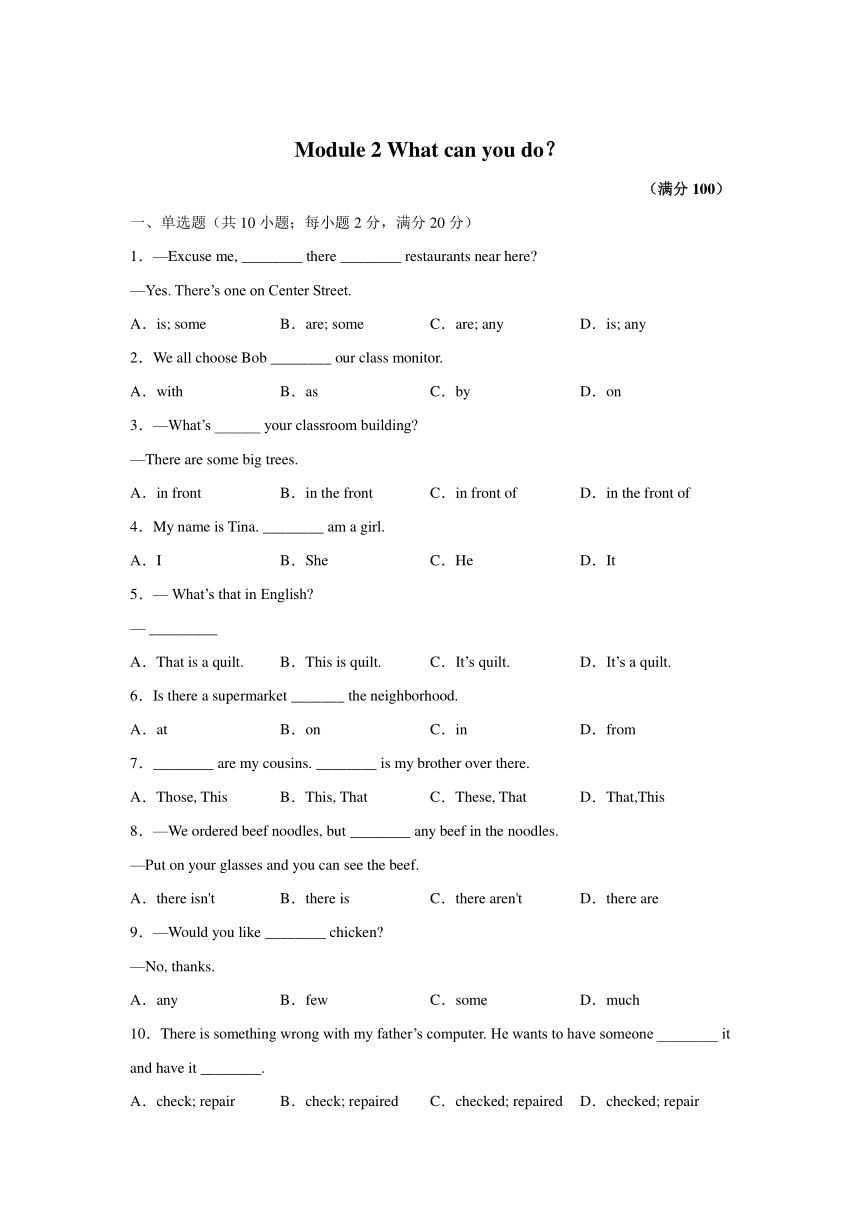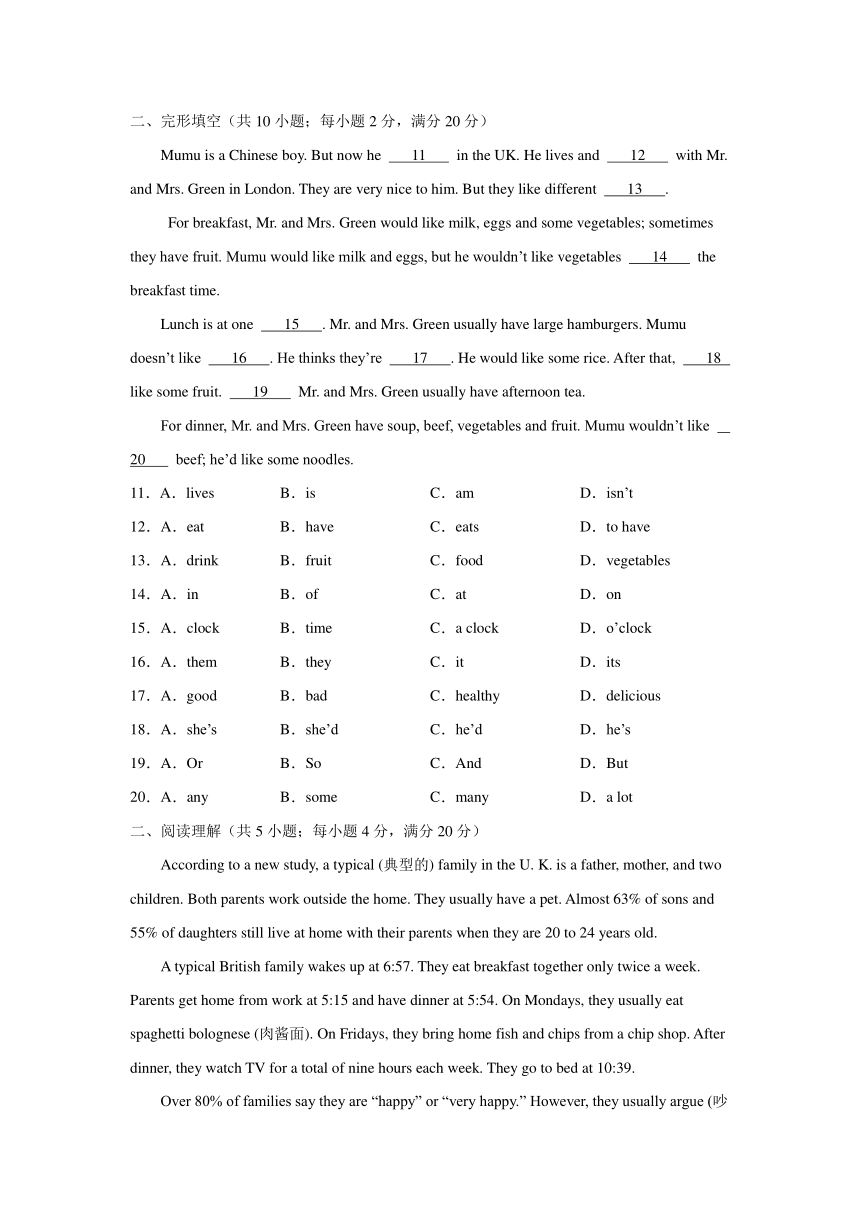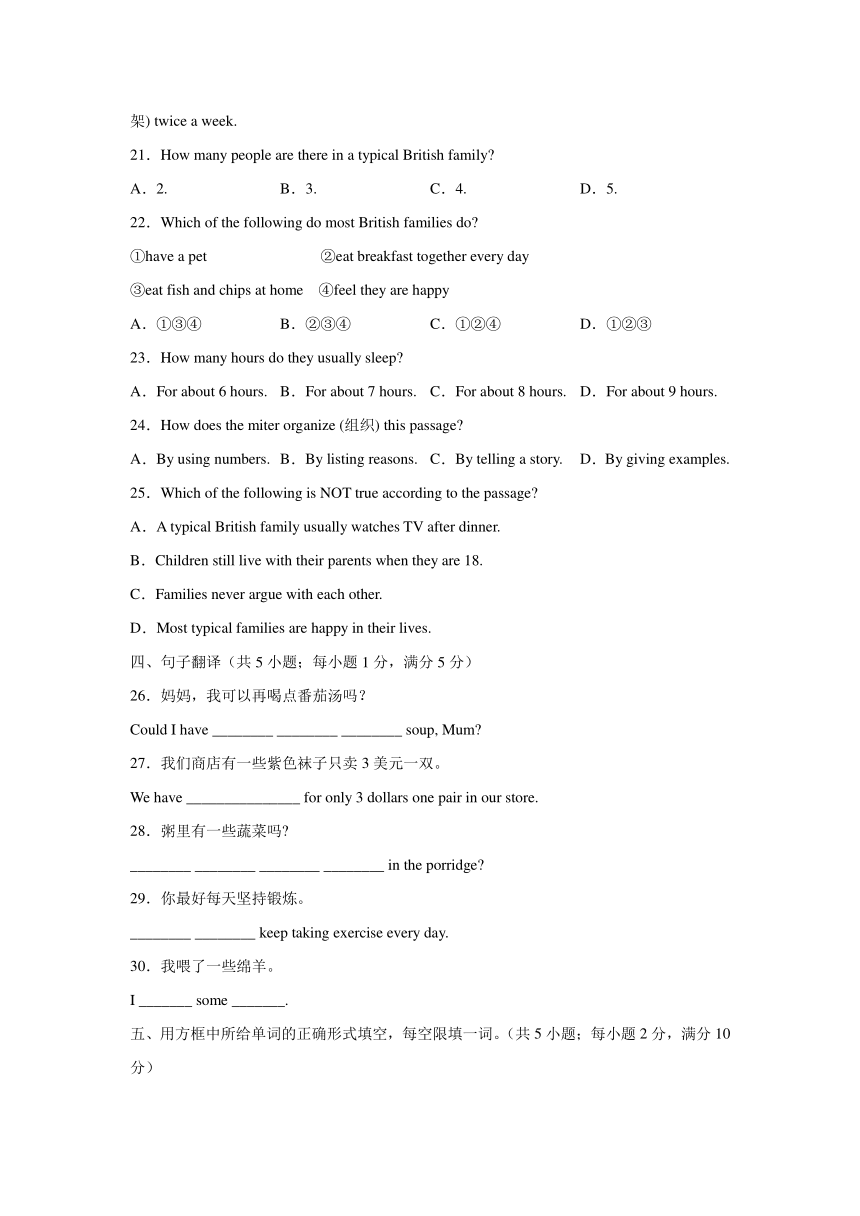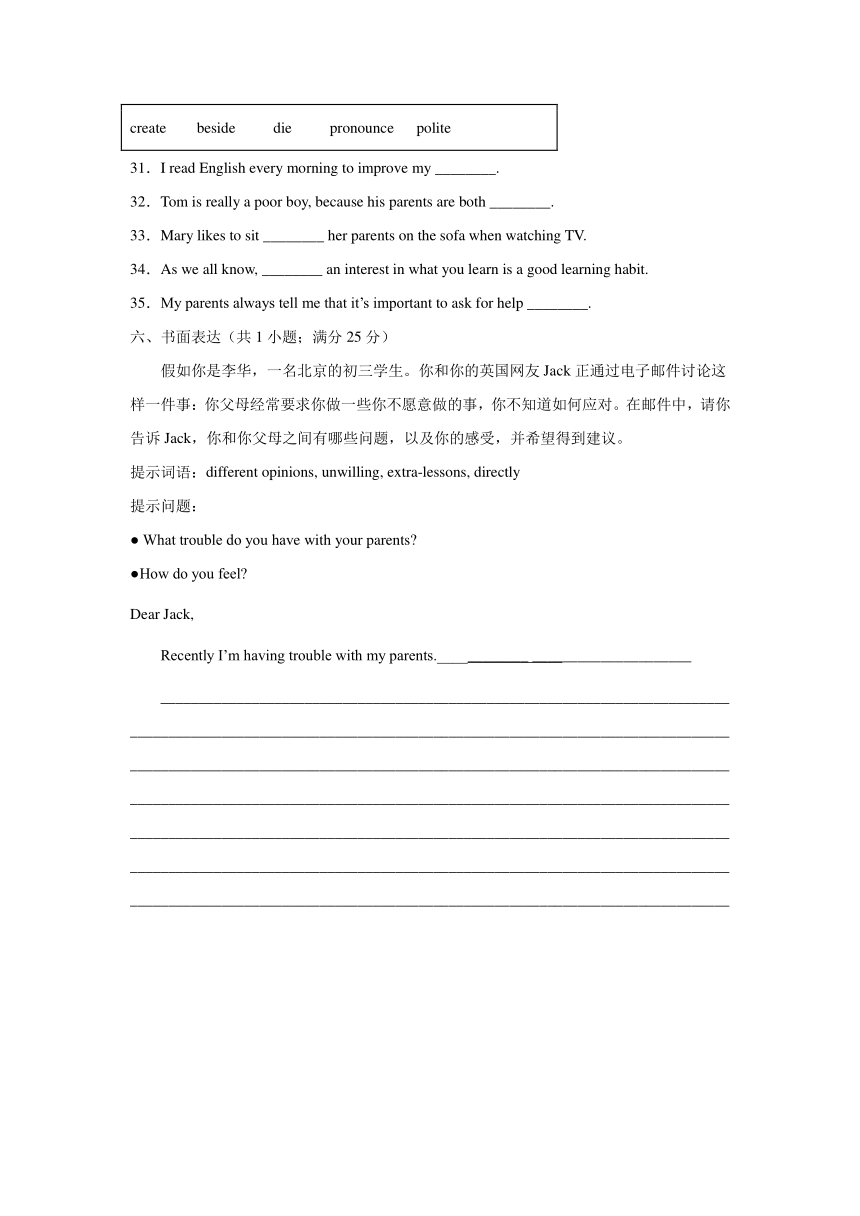外研版七年级下册英语Module 2 What can you do?单元测试卷 (含解析)
文档属性
| 名称 | 外研版七年级下册英语Module 2 What can you do?单元测试卷 (含解析) |  | |
| 格式 | doc | ||
| 文件大小 | 48.0KB | ||
| 资源类型 | 教案 | ||
| 版本资源 | 外研版 | ||
| 科目 | 英语 | ||
| 更新时间 | 2022-02-23 20:33:24 | ||
图片预览




文档简介
Module 2 What can you do?
(满分100)
一、单选题(共10小题;每小题2分,满分20分)
1.—Excuse me, ________ there ________ restaurants near here
—Yes. There’s one on Center Street.
A.is; some B.are; some C.are; any D.is; any
2.We all choose Bob ________ our class monitor.
A.with B.as C.by D.on
3.—What’s ______ your classroom building
—There are some big trees.
A.in front B.in the front C.in front of D.in the front of
4.My name is Tina. ________ am a girl.
A.I B.She C.He D.It
5.— What’s that in English
— _________
A.That is a quilt. B.This is quilt. C.It’s quilt. D.It’s a quilt.
6.Is there a supermarket _______ the neighborhood.
A.at B.on C.in D.from
7.________ are my cousins. ________ is my brother over there.
A.Those, This B.This, That C.These, That D.That,This
8.—We ordered beef noodles, but ________ any beef in the noodles.
—Put on your glasses and you can see the beef.
A.there isn't B.there is C.there aren't D.there are
9.—Would you like ________ chicken
—No, thanks.
A.any B.few C.some D.much
10.There is something wrong with my father’s computer. He wants to have someone ________ it and have it ________.
A.check; repair B.check; repaired C.checked; repaired D.checked; repair
二、完形填空(共10小题;每小题2分,满分20分)
Mumu is a Chinese boy. But now he 11 in the UK. He lives and 12 with Mr. and Mrs. Green in London. They are very nice to him. But they like different 13 .
For breakfast, Mr. and Mrs. Green would like milk, eggs and some vegetables; sometimes they have fruit. Mumu would like milk and eggs, but he wouldn’t like vegetables 14 the breakfast time.
Lunch is at one 15 . Mr. and Mrs. Green usually have large hamburgers. Mumu doesn’t like 16 . He thinks they’re 17 . He would like some rice. After that, 18 like some fruit. 19 Mr. and Mrs. Green usually have afternoon tea.
For dinner, Mr. and Mrs. Green have soup, beef, vegetables and fruit. Mumu wouldn’t like 20 beef; he’d like some noodles.
11.A.lives B.is C.am D.isn’t
12.A.eat B.have C.eats D.to have
13.A.drink B.fruit C.food D.vegetables
14.A.in B.of C.at D.on
15.A.clock B.time C.a clock D.o’clock
16.A.them B.they C.it D.its
17.A.good B.bad C.healthy D.delicious
18.A.she’s B.she’d C.he’d D.he’s
19.A.Or B.So C.And D.But
20.A.any B.some C.many D.a lot
二、阅读理解(共5小题;每小题4分,满分20分)
According to a new study, a typical (典型的) family in the U. K. is a father, mother, and two children. Both parents work outside the home. They usually have a pet. Almost 63% of sons and 55% of daughters still live at home with their parents when they are 20 to 24 years old.
A typical British family wakes up at 6:57. They eat breakfast together only twice a week. Parents get home from work at 5:15 and have dinner at 5:54. On Mondays, they usually eat spaghetti bolognese (肉酱面). On Fridays, they bring home fish and chips from a chip shop. After dinner, they watch TV for a total of nine hours each week. They go to bed at 10:39.
Over 80% of families say they are “happy” or “very happy.” However, they usually argue (吵架) twice a week.
21.How many people are there in a typical British family
A.2. B.3. C.4. D.5.
22.Which of the following do most British families do
①have a pet ②eat breakfast together every day
③eat fish and chips at home ④feel they are happy
A.①③④ B.②③④ C.①②④ D.①②③
23.How many hours do they usually sleep
A.For about 6 hours. B.For about 7 hours. C.For about 8 hours. D.For about 9 hours.
24.How does the miter organize (组织) this passage
A.By using numbers. B.By listing reasons. C.By telling a story. D.By giving examples.
25.Which of the following is NOT true according to the passage
A.A typical British family usually watches TV after dinner.
B.Children still live with their parents when they are 18.
C.Families never argue with each other.
D.Most typical families are happy in their lives.
四、句子翻译(共5小题;每小题1分,满分5分)
26.妈妈,我可以再喝点番茄汤吗?
Could I have ________ ________ ________ soup, Mum
27.我们商店有一些紫色袜子只卖3美元一双。
We have _______________ for only 3 dollars one pair in our store.
28.粥里有一些蔬菜吗
________ ________ ________ ________ in the porridge
29.你最好每天坚持锻炼。
________ ________ keep taking exercise every day.
30.我喂了一些绵羊。
I _______ some _______.
五、用方框中所给单词的正确形式填空,每空限填一词。(共5小题;每小题2分,满分10分)
create beside die pronounce polite
31.I read English every morning to improve my ________.
32.Tom is really a poor boy, because his parents are both ________.
33.Mary likes to sit ________ her parents on the sofa when watching TV.
34.As we all know, ________ an interest in what you learn is a good learning habit.
35.My parents always tell me that it’s important to ask for help ________.
六、书面表达(共1小题;满分25分)
假如你是李华,一名北京的初三学生。你和你的英国网友Jack正通过电子邮件讨论这样一件事:你父母经常要求你做一些你不愿意做的事,你不知道如何应对。在邮件中,请你告诉Jack,你和你父母之间有哪些问题,以及你的感受,并希望得到建议。
提示词语:different opinions, unwilling, extra-lessons, directly
提示问题:
● What trouble do you have with your parents
●How do you feel
Dear Jack,
Recently I’m having trouble with my parents.____________ _____________________
_____________________________________________________________________________________________________________________________________________________________________________________________________________________________________________________________________________________________________________________________________________________________________________________________________________________________________________________________________________________________________________________________________________________________________
答案以及解析
一、单选题
1.答案:C
解析:句意:——打扰一下,这附近有餐馆吗?——有的。中央大街有一家。考查some和any。is是,be动词单数;are是,be动词复数;some一些,用在肯定句中;any任何一些,用在否定或疑问句中,根据句子在疑问句,所以第二个空用any,排除A和B,由“restaurants”可知,应该用are there,排除D,故选C。
2.答案:B
解析:句意:我们都选择鲍勃作为我们的班长。考查介词辨析。with“和,用”;as“作为”;by“通过”;on“在……上”。根据句中“choose”以及“our class monitor”可知,选择鲍勃作为我们的班长。故选B。
3.答案:C
解析:句意:——你的教学楼前面是什么?——那里有一些大树。考查介词短语。in front 在前面;in the front在前边;in front of在……前面(外部);in the front of在……前面(外部)。此处表示“在某物前面”,排除A和B。根据语境,大树应该在教学楼外的前面,故选C。
4.答案:A
解析:句意:我叫蒂娜。我是一个女孩。考查代词辨析。I我;She她;He他;It它。根据句意和“am”可知,空格处缺少主语,应用人称代词主格“I”表示“我”。故选A。
5.答案:D
解析:句意:——那用英语是什么?——它是一床被子。考查特殊疑问句的回答。That is a quilt.那是一床被子;This is quilt.这是一床被子;It’s quilt.错误形式;It’s a quilt.它是一床被子。根据“What’s that in English ”可知,回答中主语应用人称代词代替,quilt是可数名词,表示单数时,前面要用不定冠词修饰,故选D。
6.答案:C
解析:句意:在附近有超市吗?考查介词辨析。at在;on在……上;in在……里;from来自。固定搭配in the neighborhood“在附近”,故选C。
7.答案:C
解析:句意:这是我的堂哥们。在那儿的是我哥哥。考查指示代词。指示代词this/these是近指,that/those是远指。根据语境,可知第一空近指,第二空远指。再根据第一空后的are,可知用复数these,第二空后的is,可知用单数that,故选C。
8.答案:A
解析:句意:——我们点了牛肉面,但是在面里没有牛肉。——戴上眼镜你就能看到牛肉。
考查there be结构。主语为不可数名词beef,be动词用is;且根据any可知,是否定句,故选A。
9.答案:C
解析:句意:——你想要一些鸡肉吗?——不,谢谢。考查代词辨析。any任何东西,用在否定句和疑问句中;few很少,修饰可数名词复数形式;some一些,修饰可数名词复数或不可数名词,用在肯定句中,在疑问句希望得到对方的肯定回答;much许多,修饰不可数名词;根据“Would you like...chicken ”和“No, thanks.”可知,此处是希望得到对方的肯定回答,some用于疑问句中表示请求,建议等。故选C。
10.答案:B
解析:句意:我爸爸的电脑出问题了。他想让人检查一下并把它修好。考查非谓语动词。have此处表示“使,让”,属于使役动词,后接宾语和宾语补足语;当宾语和宾补构成主动关系时,用have sb. do sth.“让某人做某事”;当宾语和宾补构成被动关系时,用have sth. done“让某事/物被做”;根据语境可知,第一个空“某人检查”为主动,用check,第二个空“电脑被修理”为被动,用repaired。故选B。
二、完形填空
答案:11.A 12.C 13.C 14.C 15.D 16.A 17.B 18.C 19.D 20.A
解析: 11.句意:但是现在他居住在英国。lives居住;is是;am是;isn’t不是。根据“He lives and...with Mr. and Mrs. Green in London.”可知,此处指他在伦敦住。故选A。
12.句意:他和格林夫妇在伦敦一起住和吃饭。eat吃,动词原形;have吃,动词原形;eats吃,动词第三人称单数;to have吃,动词不定式。分析句子可知,and连接并列的谓语动词,故空处动词的形式要与lives保持一致。故选C。
13.句意:但是他们喜欢不同的食物。drink饮料;fruit水果;food食物;vegetables蔬菜。根据“For breakfast, Mr. and Mrs. Green would like milk, eggs and some vegetables; sometimes they have fruit. Mumu would like milk and eggs, but he wouldn’t like vegetables ”可知,此处指他们喜欢不同的食物。故选C。
14.句意:Mumu喜欢牛奶和鸡蛋,但他不喜欢在早饭时吃蔬菜。in在,后接年、月、季节和世纪等;of属于……的;at在,后接具体时刻;on在,后接具体日期。at the breakfast time意为“在早餐时间”,是固定搭配。故选C。
15.句意:午餐时间在一点钟。clock钟;time时间;a clock一个钟;o’clock点钟。在整点后要用o’clock。故选D。
16.句意:Mumu不喜欢它们。them它们,宾格;they 它们,主格;it它;its它的。 联系上句可知此空所填词指代上文提到的hamburgers,是可数名词复数,且动词like后要用代词的宾格形式。故选A。
17.句意:他认为它们不好。good好的;bad坏的;healthy健康的;delicious美味的。由前句“Mumu doesn’t like ...”可知,他认为汉堡包不好。故选B。
18.句意:然后,他喜欢水果。she’s是she is或she has的缩写;she’d是she would的缩写;he’d是he would的缩写;he’s是he is或he has的缩写。由“He would like some rice. After that...like some fruit.”可推知,此处表示他喜欢水果,he would可缩写为he’d。故选C。
19.句意:但是格林夫妇通常喝下午茶。Or否则;So因此;And并且;But但是。“He would like some rice. After that...like some fruit.”与“...Mr. and Mrs. Green usually have afternoon tea.”是转折关系,用But连接。故选D。
20.句意:Mumu不喜欢吃牛肉;他喜欢面条。any任何,修饰可数名词复数或不可数名词时,常用于疑问句或否定句中;some一些, 既可以修饰可数名词复数也可以修饰不可数名词,一般位于肯定句中;many很多,修饰可数名词复数;a lot非常,修饰名词时必须加of。beef“牛肉”为不可数名词,且本句为否定句,所以应用any修饰。故选A。
三、阅读理解
21.C
22.A
23.C
24.A
25.C
解析:21.细节理解题。根据“According to a new study, a typical (典型的) family in the U.K. is a father, mother, and two children.”可知,家里通常有四口人,故选C。
22.细节理解题。根据“They usually have a pet.”,“They eat breakfast together only twice a week.”和“Over 80% of families say they are ‘happy’ or ‘very happy.’”可知,英国家庭通常做的是①③④,故选A。
23.细节理解题。根据“A typical British family wakes up at 6:57...They go to bed at 10:39.”可知,通常晚上10:39睡觉,早上6:57起床,大约睡8个小时,故选C。
24.细节理解题。分析文章内容可知,作者主要以列数字的方法进行介绍,故选A。
25.推理判断题。根据“However, they usually argue (吵架) twice a week.”可知,他们通常一周争吵两次,并不是不吵架。故选C。
四、句子翻译
26.some more tomato
27.(some) socks in purple/(some) purple socks
28.Are there any vegetables
29.You’d better
30.fed sheep
五、语法填空
31.pronunciation
32.dead
33.beside
34.creating
35.politely
解析:31.句意:我每天早上读英语提高我的发音。根据“I read English every morning to improve my…”可知读英语是为了提高发音,my为形容词性物主代词,其后加名词pronunciation。故填pronunciation。
32.句意:汤姆真是个可怜的孩子,因为他的父母都死了。根据“Tom is really a poor boy, because his parents are both…”可知汤姆的父母都去世了,所以他很可怜,be动词后加形容词dead。故填dead。
33.句意:看电视时,玛丽喜欢坐在沙发上她父母旁边。根据“Mary likes to sit…her parents on the sofa when watching TV.”可知是坐在父母旁边,用介词beside。故填beside。
34.句意:众所周知,对所学内容产生兴趣是一种良好的学习习惯。根据“…an interest in what you learn is a good learning habit”可知是对所学的东西产生兴趣,此处作主语用动名词creating“产生”。故填creating。
35.句意:我的父母总是告诉我,礼貌地寻求帮助很重要。此处修饰动词ask用副词politely“礼貌地”。故填politely。
六、书面表达
Dear Jack,
Recently I’m having trouble with my parents. They often force me to do something I don’t want to do. For example, they forced me to take may extra class lessons, like piano lessons. But in fact, I have little interest in it. I just don’t know how to talk with them. I don’t want to let them down. Can you help me to find a way to talk to them directly
Yours,
Li Hua
(满分100)
一、单选题(共10小题;每小题2分,满分20分)
1.—Excuse me, ________ there ________ restaurants near here
—Yes. There’s one on Center Street.
A.is; some B.are; some C.are; any D.is; any
2.We all choose Bob ________ our class monitor.
A.with B.as C.by D.on
3.—What’s ______ your classroom building
—There are some big trees.
A.in front B.in the front C.in front of D.in the front of
4.My name is Tina. ________ am a girl.
A.I B.She C.He D.It
5.— What’s that in English
— _________
A.That is a quilt. B.This is quilt. C.It’s quilt. D.It’s a quilt.
6.Is there a supermarket _______ the neighborhood.
A.at B.on C.in D.from
7.________ are my cousins. ________ is my brother over there.
A.Those, This B.This, That C.These, That D.That,This
8.—We ordered beef noodles, but ________ any beef in the noodles.
—Put on your glasses and you can see the beef.
A.there isn't B.there is C.there aren't D.there are
9.—Would you like ________ chicken
—No, thanks.
A.any B.few C.some D.much
10.There is something wrong with my father’s computer. He wants to have someone ________ it and have it ________.
A.check; repair B.check; repaired C.checked; repaired D.checked; repair
二、完形填空(共10小题;每小题2分,满分20分)
Mumu is a Chinese boy. But now he 11 in the UK. He lives and 12 with Mr. and Mrs. Green in London. They are very nice to him. But they like different 13 .
For breakfast, Mr. and Mrs. Green would like milk, eggs and some vegetables; sometimes they have fruit. Mumu would like milk and eggs, but he wouldn’t like vegetables 14 the breakfast time.
Lunch is at one 15 . Mr. and Mrs. Green usually have large hamburgers. Mumu doesn’t like 16 . He thinks they’re 17 . He would like some rice. After that, 18 like some fruit. 19 Mr. and Mrs. Green usually have afternoon tea.
For dinner, Mr. and Mrs. Green have soup, beef, vegetables and fruit. Mumu wouldn’t like 20 beef; he’d like some noodles.
11.A.lives B.is C.am D.isn’t
12.A.eat B.have C.eats D.to have
13.A.drink B.fruit C.food D.vegetables
14.A.in B.of C.at D.on
15.A.clock B.time C.a clock D.o’clock
16.A.them B.they C.it D.its
17.A.good B.bad C.healthy D.delicious
18.A.she’s B.she’d C.he’d D.he’s
19.A.Or B.So C.And D.But
20.A.any B.some C.many D.a lot
二、阅读理解(共5小题;每小题4分,满分20分)
According to a new study, a typical (典型的) family in the U. K. is a father, mother, and two children. Both parents work outside the home. They usually have a pet. Almost 63% of sons and 55% of daughters still live at home with their parents when they are 20 to 24 years old.
A typical British family wakes up at 6:57. They eat breakfast together only twice a week. Parents get home from work at 5:15 and have dinner at 5:54. On Mondays, they usually eat spaghetti bolognese (肉酱面). On Fridays, they bring home fish and chips from a chip shop. After dinner, they watch TV for a total of nine hours each week. They go to bed at 10:39.
Over 80% of families say they are “happy” or “very happy.” However, they usually argue (吵架) twice a week.
21.How many people are there in a typical British family
A.2. B.3. C.4. D.5.
22.Which of the following do most British families do
①have a pet ②eat breakfast together every day
③eat fish and chips at home ④feel they are happy
A.①③④ B.②③④ C.①②④ D.①②③
23.How many hours do they usually sleep
A.For about 6 hours. B.For about 7 hours. C.For about 8 hours. D.For about 9 hours.
24.How does the miter organize (组织) this passage
A.By using numbers. B.By listing reasons. C.By telling a story. D.By giving examples.
25.Which of the following is NOT true according to the passage
A.A typical British family usually watches TV after dinner.
B.Children still live with their parents when they are 18.
C.Families never argue with each other.
D.Most typical families are happy in their lives.
四、句子翻译(共5小题;每小题1分,满分5分)
26.妈妈,我可以再喝点番茄汤吗?
Could I have ________ ________ ________ soup, Mum
27.我们商店有一些紫色袜子只卖3美元一双。
We have _______________ for only 3 dollars one pair in our store.
28.粥里有一些蔬菜吗
________ ________ ________ ________ in the porridge
29.你最好每天坚持锻炼。
________ ________ keep taking exercise every day.
30.我喂了一些绵羊。
I _______ some _______.
五、用方框中所给单词的正确形式填空,每空限填一词。(共5小题;每小题2分,满分10分)
create beside die pronounce polite
31.I read English every morning to improve my ________.
32.Tom is really a poor boy, because his parents are both ________.
33.Mary likes to sit ________ her parents on the sofa when watching TV.
34.As we all know, ________ an interest in what you learn is a good learning habit.
35.My parents always tell me that it’s important to ask for help ________.
六、书面表达(共1小题;满分25分)
假如你是李华,一名北京的初三学生。你和你的英国网友Jack正通过电子邮件讨论这样一件事:你父母经常要求你做一些你不愿意做的事,你不知道如何应对。在邮件中,请你告诉Jack,你和你父母之间有哪些问题,以及你的感受,并希望得到建议。
提示词语:different opinions, unwilling, extra-lessons, directly
提示问题:
● What trouble do you have with your parents
●How do you feel
Dear Jack,
Recently I’m having trouble with my parents.____________ _____________________
_____________________________________________________________________________________________________________________________________________________________________________________________________________________________________________________________________________________________________________________________________________________________________________________________________________________________________________________________________________________________________________________________________________________________________
答案以及解析
一、单选题
1.答案:C
解析:句意:——打扰一下,这附近有餐馆吗?——有的。中央大街有一家。考查some和any。is是,be动词单数;are是,be动词复数;some一些,用在肯定句中;any任何一些,用在否定或疑问句中,根据句子在疑问句,所以第二个空用any,排除A和B,由“restaurants”可知,应该用are there,排除D,故选C。
2.答案:B
解析:句意:我们都选择鲍勃作为我们的班长。考查介词辨析。with“和,用”;as“作为”;by“通过”;on“在……上”。根据句中“choose”以及“our class monitor”可知,选择鲍勃作为我们的班长。故选B。
3.答案:C
解析:句意:——你的教学楼前面是什么?——那里有一些大树。考查介词短语。in front 在前面;in the front在前边;in front of在……前面(外部);in the front of在……前面(外部)。此处表示“在某物前面”,排除A和B。根据语境,大树应该在教学楼外的前面,故选C。
4.答案:A
解析:句意:我叫蒂娜。我是一个女孩。考查代词辨析。I我;She她;He他;It它。根据句意和“am”可知,空格处缺少主语,应用人称代词主格“I”表示“我”。故选A。
5.答案:D
解析:句意:——那用英语是什么?——它是一床被子。考查特殊疑问句的回答。That is a quilt.那是一床被子;This is quilt.这是一床被子;It’s quilt.错误形式;It’s a quilt.它是一床被子。根据“What’s that in English ”可知,回答中主语应用人称代词代替,quilt是可数名词,表示单数时,前面要用不定冠词修饰,故选D。
6.答案:C
解析:句意:在附近有超市吗?考查介词辨析。at在;on在……上;in在……里;from来自。固定搭配in the neighborhood“在附近”,故选C。
7.答案:C
解析:句意:这是我的堂哥们。在那儿的是我哥哥。考查指示代词。指示代词this/these是近指,that/those是远指。根据语境,可知第一空近指,第二空远指。再根据第一空后的are,可知用复数these,第二空后的is,可知用单数that,故选C。
8.答案:A
解析:句意:——我们点了牛肉面,但是在面里没有牛肉。——戴上眼镜你就能看到牛肉。
考查there be结构。主语为不可数名词beef,be动词用is;且根据any可知,是否定句,故选A。
9.答案:C
解析:句意:——你想要一些鸡肉吗?——不,谢谢。考查代词辨析。any任何东西,用在否定句和疑问句中;few很少,修饰可数名词复数形式;some一些,修饰可数名词复数或不可数名词,用在肯定句中,在疑问句希望得到对方的肯定回答;much许多,修饰不可数名词;根据“Would you like...chicken ”和“No, thanks.”可知,此处是希望得到对方的肯定回答,some用于疑问句中表示请求,建议等。故选C。
10.答案:B
解析:句意:我爸爸的电脑出问题了。他想让人检查一下并把它修好。考查非谓语动词。have此处表示“使,让”,属于使役动词,后接宾语和宾语补足语;当宾语和宾补构成主动关系时,用have sb. do sth.“让某人做某事”;当宾语和宾补构成被动关系时,用have sth. done“让某事/物被做”;根据语境可知,第一个空“某人检查”为主动,用check,第二个空“电脑被修理”为被动,用repaired。故选B。
二、完形填空
答案:11.A 12.C 13.C 14.C 15.D 16.A 17.B 18.C 19.D 20.A
解析: 11.句意:但是现在他居住在英国。lives居住;is是;am是;isn’t不是。根据“He lives and...with Mr. and Mrs. Green in London.”可知,此处指他在伦敦住。故选A。
12.句意:他和格林夫妇在伦敦一起住和吃饭。eat吃,动词原形;have吃,动词原形;eats吃,动词第三人称单数;to have吃,动词不定式。分析句子可知,and连接并列的谓语动词,故空处动词的形式要与lives保持一致。故选C。
13.句意:但是他们喜欢不同的食物。drink饮料;fruit水果;food食物;vegetables蔬菜。根据“For breakfast, Mr. and Mrs. Green would like milk, eggs and some vegetables; sometimes they have fruit. Mumu would like milk and eggs, but he wouldn’t like vegetables ”可知,此处指他们喜欢不同的食物。故选C。
14.句意:Mumu喜欢牛奶和鸡蛋,但他不喜欢在早饭时吃蔬菜。in在,后接年、月、季节和世纪等;of属于……的;at在,后接具体时刻;on在,后接具体日期。at the breakfast time意为“在早餐时间”,是固定搭配。故选C。
15.句意:午餐时间在一点钟。clock钟;time时间;a clock一个钟;o’clock点钟。在整点后要用o’clock。故选D。
16.句意:Mumu不喜欢它们。them它们,宾格;they 它们,主格;it它;its它的。 联系上句可知此空所填词指代上文提到的hamburgers,是可数名词复数,且动词like后要用代词的宾格形式。故选A。
17.句意:他认为它们不好。good好的;bad坏的;healthy健康的;delicious美味的。由前句“Mumu doesn’t like ...”可知,他认为汉堡包不好。故选B。
18.句意:然后,他喜欢水果。she’s是she is或she has的缩写;she’d是she would的缩写;he’d是he would的缩写;he’s是he is或he has的缩写。由“He would like some rice. After that...like some fruit.”可推知,此处表示他喜欢水果,he would可缩写为he’d。故选C。
19.句意:但是格林夫妇通常喝下午茶。Or否则;So因此;And并且;But但是。“He would like some rice. After that...like some fruit.”与“...Mr. and Mrs. Green usually have afternoon tea.”是转折关系,用But连接。故选D。
20.句意:Mumu不喜欢吃牛肉;他喜欢面条。any任何,修饰可数名词复数或不可数名词时,常用于疑问句或否定句中;some一些, 既可以修饰可数名词复数也可以修饰不可数名词,一般位于肯定句中;many很多,修饰可数名词复数;a lot非常,修饰名词时必须加of。beef“牛肉”为不可数名词,且本句为否定句,所以应用any修饰。故选A。
三、阅读理解
21.C
22.A
23.C
24.A
25.C
解析:21.细节理解题。根据“According to a new study, a typical (典型的) family in the U.K. is a father, mother, and two children.”可知,家里通常有四口人,故选C。
22.细节理解题。根据“They usually have a pet.”,“They eat breakfast together only twice a week.”和“Over 80% of families say they are ‘happy’ or ‘very happy.’”可知,英国家庭通常做的是①③④,故选A。
23.细节理解题。根据“A typical British family wakes up at 6:57...They go to bed at 10:39.”可知,通常晚上10:39睡觉,早上6:57起床,大约睡8个小时,故选C。
24.细节理解题。分析文章内容可知,作者主要以列数字的方法进行介绍,故选A。
25.推理判断题。根据“However, they usually argue (吵架) twice a week.”可知,他们通常一周争吵两次,并不是不吵架。故选C。
四、句子翻译
26.some more tomato
27.(some) socks in purple/(some) purple socks
28.Are there any vegetables
29.You’d better
30.fed sheep
五、语法填空
31.pronunciation
32.dead
33.beside
34.creating
35.politely
解析:31.句意:我每天早上读英语提高我的发音。根据“I read English every morning to improve my…”可知读英语是为了提高发音,my为形容词性物主代词,其后加名词pronunciation。故填pronunciation。
32.句意:汤姆真是个可怜的孩子,因为他的父母都死了。根据“Tom is really a poor boy, because his parents are both…”可知汤姆的父母都去世了,所以他很可怜,be动词后加形容词dead。故填dead。
33.句意:看电视时,玛丽喜欢坐在沙发上她父母旁边。根据“Mary likes to sit…her parents on the sofa when watching TV.”可知是坐在父母旁边,用介词beside。故填beside。
34.句意:众所周知,对所学内容产生兴趣是一种良好的学习习惯。根据“…an interest in what you learn is a good learning habit”可知是对所学的东西产生兴趣,此处作主语用动名词creating“产生”。故填creating。
35.句意:我的父母总是告诉我,礼貌地寻求帮助很重要。此处修饰动词ask用副词politely“礼貌地”。故填politely。
六、书面表达
Dear Jack,
Recently I’m having trouble with my parents. They often force me to do something I don’t want to do. For example, they forced me to take may extra class lessons, like piano lessons. But in fact, I have little interest in it. I just don’t know how to talk with them. I don’t want to let them down. Can you help me to find a way to talk to them directly
Yours,
Li Hua
同课章节目录
- Module 1 Lost and found
- Unit 1 Whose bag is this?
- Unit 2 Are they yours?
- Unit 3 Language in use
- Module 2 What can you do ?
- Unit 1 I can play the piano
- Unit 2 I can run really fast
- Unit 3 Language in use
- Module 3 Making plans
- Unit 1 What are you going to do at the weekends?
- Unit 2 We're going to cheer the players.
- Unit 3 Language in use
- Module 4 Life in the future
- Unit 1 Everyone will study at home
- Unit 2 Every family will have a small plane.
- Unit 3 Language in use
- Module 5 Shopping
- Unit 1 What can I do for you?
- Unit 2 You can buy everything on the Internet
- Unit 3 Language in use
- Module 6 Around town
- Unit 1 Could you tell me how to get to the Nationa
- Unit 2 The London Eye is on your right.
- Unit 3 Language in use
- Revision module A
- Module 7 My past life
- Unit 1 I was born in a small village.
- Unit 2 I was born in Quincy.
- Unit 3 Language in use
- Module 8 Story time
- Unit 1 Once upon a time….
- Unit 2 Goldilocks hurried out of the house.
- Unit 3 Language in use
- Module 9 Life history
- Unit 1 He left school and began work at the age of
- Unit 2 He decided to be an actor.
- Unit 3 Language in use
- Module 10 A holiday journey
- Unit 1 What did you do?
- Unit 2 This morning we took a walk.
- Unit 3 Language in use
- Module 11 Body language
- Unit 1 They touch noses!
- Unit 2 Here are some ways to welcome them.
- Unit 3 Language in use
- Module 12 Western music
- Unit 1 It's so beautiful!
- Unit 2 Vienna is the centre of European classical
- Unit 3 Language in use
- Revision module B
